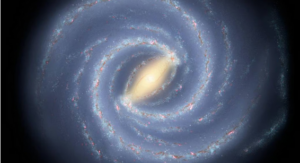Phosphorus – a key ingredient for life as we know it – was thought to be relatively rare in space. But now, astronomers have detected a surprising amount of the stuff on the fringes of the galaxy, suggesting life may be more common in the cosmos.
Life on Earth requires six critical elements: nitrogen, carbon, hydrogen, oxygen, phosphorus and sulfur (NCHOPS). Most of those are relatively easy to come by, as they’re blown into space as common low-mass stars reach the end of their lives. Phosphorus, meanwhile, is much rarer, and as such is generally considered the limiting factor for life in the universe.
“To make phosphorus, you need some kind of violent event,” said Lucy Ziurys, corresponding author of the study. “It is thought that phosphorus is created in supernova explosions, and for that, you need a star that has at least 20 times the mass of the Sun. In other words, if you’re going to have life, you better be near a supernova, if that’s indeed the only source where phosphorus is created.”
Continue here: New Atlas
Ask me anything
Explore related questions





